BOB ABERNETHY, anchor: On the eve of the Iowa caucuses and this election year's State of the Union address, President Bush proposed this week a $1.5 billion campaign to promote marriage. But many religious conservatives want the president to go further and back a constitutional amendment defining marriage as between a man and woman, not two people of the same sex.
As the pros and cons of gay marriage become a campaign issue, we have a provocative story this week from Betty Rollin on gay parents and their children. According to the Census Bureau, of the country's nearly half a million same-sex couples, nearly a quarter -- 28 percent -- are raising children.
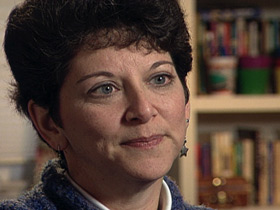
TERESA: The most awful part of my life is when I first realized I was a lesbian and therefore thought I wouldn't have children.
BETTY ROLLIN: A prediction that turned out to be totally wrong. Teresa and her partner Jo, who have been together for 19 years and live in a Maryland suburb, have three children, all born to them.
JO: It was decided that Teresa would go first, I would go second, and it ended up that I would have the third as well. The children know who their biological mothers are, but that's the only difference they see in us. When they want juice, they get either one of us. When they need us to comfort them, they get either one of us.
ROLLIN: Jacob is 13, Matthew is nine, and Bina is three. The kids are pretty matter-of-fact about their situation.
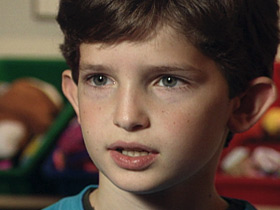
JACOB: I have two moms and they're lesbians and it doesn't make a difference. They love each other and they love us and we love them.
ROLLIN: How do you explain to other kids?
MATTHEW: I just have two moms and they love each other like your parents. Some get it and some don't.
ROLLIN: If they don't get it, what do they say?
MATTHEW: What?!
ROLLIN: Remember HEATHER HAS TWO MOMMIES? When the book was first published 15 years ago, there was an uproar. The book was banned in some libraries, even condemned on the Senate floor. Today, many people are still in an uproar about gays having children, but whether through adoption -- legal now in most states -- or artificial insemination, many more gays are becoming parents.
Sixteen-year-old Hope has two dads -- Wayne Steinman and Sal Iacullo. In 1987, Hope was four months old, cocaine-addicted, and in the care of a New York City adoption agency.
SAL IACULLO: We made arrangements to visit the child at the adoption agency and Hope was placed in my arms and at that point I knew that Hope belonged to us. We said, "Yes, this is our child," and they said, "Okay, come back on Monday to pick her up." We went back to the agency on Monday, accompanied by my parents and Wayne's mom, and we took her home with us.
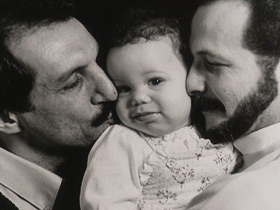
I became kind of the mommy figure, actually at one point when Hope was very young she did refer to me as "Mommy-Daddy" -- she called me "Mommy-Daddy." It was funny, but it made me melt.
WAYNE STEINMAN: I think we've fallen into the roles and responsibilities that best suit each. I'm the one who goes out shopping and does those types of outside chores, I do the gardening, I do the windows. Sal is much more nurturing than I am.
ROLLIN: Wayne and Sal went out of their way to make sure Hope did not suffer discrimination at school. Both even became presidents of the PTA.
Mr. IACULLO: Each year, we were there, we met with the teacher, we explained who we were. Hope's friends got to know us immediately. They knew who Hope's parents were. There was never any need to question "Where's your mommy?" They knew she didn't have a mommy.
ROLLIN: Hope is an honor student and has become an activist on issues involving children of gay parents.
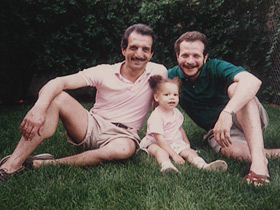
HOPE STEINMAN-IACULLO: We have been fairly lucky, we have been really welcomed by everyone. But for other families it's not like that, so I sympathize with that. I know when you hear homophobic sayings, it's hard. So I want to help make it that it's something kids won't have to deal with.
ROLLIN: There is no question that in many communities, the children of gays are stigmatized. Example: a recent case in Louisiana where a child was reprimanded by his teacher for explaining his gay family to another child.
Dr. KYLE PRUETT (Child Psychiatrist, Yale University): I think it's naïve to think this is a piece of cake for either the parents or the kids, but I also think it's inaccurate to think of it as a form of automatic trouble. But so far, the cautious read of the research would be that these kids who are growing up in these families are basically not at risk. They don't show increased rates of mental illness. They are not very much unlike the other kids that they are going to school with.
ROLLIN: Moreover, says Dr. Pruett, these children may fare better than children of single-parent families.
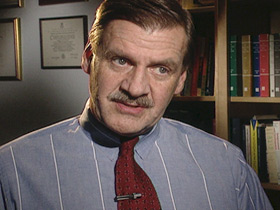
Dr. PRUETT: Two-parent families, even when the two parents are of the same gender, do seem to provide a somewhat more supportive atmosphere for kids than single parents.
ROLLIN: Robert Knight studies family issues for a conservative Christian group in Washington, DC. He thinks the only family that provides a supportive atmosphere for children is a two-parent heterosexual family, and that the children of gays will surely suffer.
ROBERT KNIGHT (Culture and Family Institute): They are missing out on the whole scope of human relations, interaction of male and female. On top of that, they are getting a distorted picture of human sexuality: men and men together, women and women together. This was not God's plan. This was not natural, and children are being told it is because that's what they are growing up with.
ROLLIN: Knight believes that the uniqueness of each gender is necessary in a family.
Mr. KNIGHT: Mothers do provide something different for children. They provide this unbelievable sense of security. Fathers provide strength; they provide a bridge to the outside world.
ROLLIN: Gay parents, like Sal, admit that their children may be missing out.
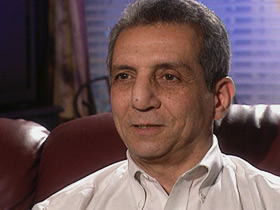
Mr. IACULLO: There were times when she would cry about missing her birth mom, which is normal in an adoption situation but even more so because there wasn't a mommy in the house. I had to face the fact that no matter what, I could not replace being a mother. I'm not a mother and I will never be a mother. And I had to make her understand that, and if she had wanted to speak about it, had wanted to cry about it, don't think you are going to hurt me by hiding that. I understand that and let's cry about it together.
ROLLIN: Critics like Knight also predict that children of gays will become gay, themselves.
Mr. KNIGHT: More of them are likely to think homosexuality is okay. More of them say they think they will experiment with it one day, and why wouldn't they if their parents are doing it?
ROLLIN: But does openness to homosexuality increase the likelihood of becoming homosexual?
Dr. PRUETT: The percentage of gay and lesbian children who come from such families are pretty much reflective of the same percentage of the population of the general public, somewhere between 5 to 9 percent.
ROLLIN: The research on gay families, though limited, does show some differences in these children, which Dr. Pruett thinks are positive.
Dr. PRUETT: They tend to have a broader worldview. They tend to be more compassionate.
ROLLIN (to Teresa): What's been the hardest part?
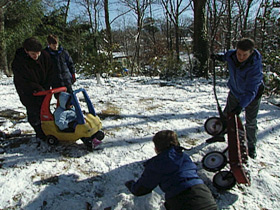
TERESA: The hardest part is continually talking about how normal we are, how normal we feel, how normal our life is.
ROLLIN: However normal gay families may feel, normalcy in the eyes of others remains elusive. But as more and more children are raised by gay parents, these families will become better known. And perhaps then, they hope, they will be seen as being like everyone else.
I'm Betty Rollin for RELIGION & ETHICS NEWSWEEKLY in Maryland.
SEVERSON: So far, according to Dr. Pruett, the Yale psychiatrist, the evidence about what happens to the children of same sex parents is incomplete. There has been no long-term, 20-year follow up -- something Dr. Pruett says is much needed.








